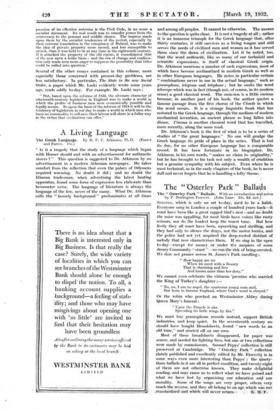The "Osterley Park " Bella s
The " Osterley Park " Ballads. With an introduction anfi.notes by F. Burlington Fawcett. (John Lane. 31s. fld. net.) SINGING, which is only an art to-day, used to be a.habit. Everyone sang in.London a couple of hundred years back—it must have been like a great ragged bird's nest—and no doubt the noise was appalling, for most birds have voices like rusty scissors, nor do the loudest keep the truest tune. But how lively they all must have been, squawking and shrilling, and they had only to silence the drays, not the motor lorries, and the police had not yet acquired the deep-rooted distirnst of melody that now characterises them. If we sing in the open to-day—except for money or under the auspices of some dreary Community " stunt "—we run the risk of being arrested. We dare not prance across St. James's Park carolling :
" How happy are we . When we meet with a Beauty That is charming and free And knows more than her duty."
We cannot even celebrate the virtuous 'prentice who married the King of Turkey's daughter :— "No, no, I am no angel, the courteous young limn said,
But born in famous England, where Cod's word is obeyed."
Or the robin who perched on Westminster Abbey during Queen Mary's funeral :
" Upon the Pinacle it sits. Spreading its little wings by fits."
We must buy gramophone records instead, support British industries, and keep quiet. In the seventeenth century we should have bought Broadsheets, found " new words to an old tune," and started off on our own.
Most of these broadsheets disappeared, for paper was scarce, and needed for lighting fires, but one or two collections were made by connoisseurs. Samuel Pepys' collection Is still preserved at Cambridge. The " Osterley Park " collection • (lately published and excellently edited by Mr. Fawcett) is in some ways even more interesting than Pepys' : the ninety- three ballads in it are all in perfect condition, and twenty:eight of them are not otherwise known. They make delightful reading, and may cause us to reflect what we have gained and what we have lost by organizing our education mid our morality. Some of the songs are very proper, others very .much the reverse, and they all belong to an age which 4s not standardized' and Which Will iievetretnrn.., WV:






































 Previous page
Previous page